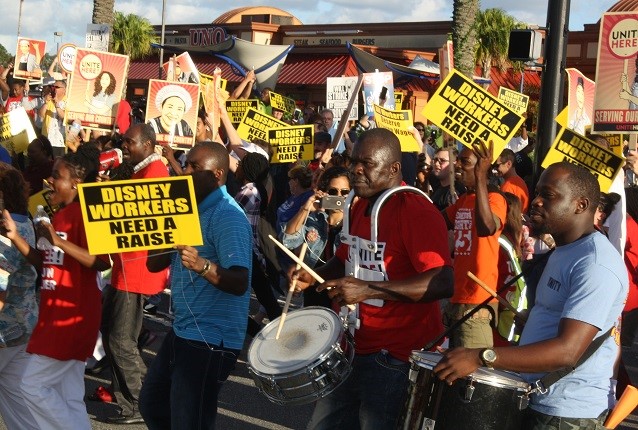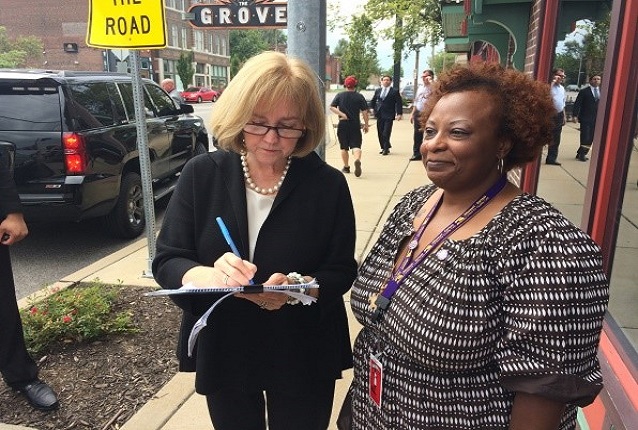Ballot initiatives restore voting rights to Floridians with past felony convictions, and raise the minimum wage and take power back from special interests in Missouri
Washington, D.C.— Jobs With Justice, a national nonprofit organization leading the fight for working peoples’ rights, today applauded the work of activists, supporters and coalitions in Florida, Maine and Missouri for their work to advance ballot initiatives that return power and agency to working people. Amendment 4 in Florida, and Amendment 1 and Proposition 4 in Missouri, which were supported by Jobs With Justice and their local coalition partners, passed with overwhelming support from voters. Question 1 in Maine, which faced well-funded opposition from out-of-touch politicians and special interests, fell short of passing.
The victories show a new path to organizing working people in the Trump Era.
“The ability of working people to get a fair deal is under attack from the Trump Administration, the courts and greedy corporations,” said Sarita Gupta, co-Executive Director of Jobs With Justice. “Yesterday, the people spoke up and demanded their power back. Ballot initiatives like these can build power for workers in a world where their rights are under constant attack. We applaud the work of activists and supporters in these states and across the country for their work electing officials and passing ballot initiatives that put workers’ rights and dignity front and center.”
“As the economy shifts to leave working people behind, we must develop innovative ways to restore their power to fight corporate profiteers,” said Erica Smiley, co-Executive Director of Jobs With Justice. “The ballot initiatives Jobs With Justice supported exemplify new ways for working people to organize that build their power to bargain and propel our economy in the right direction. We will continue to create opportunities in states across the country for all Americans to shape their workplaces, communities and democracy.”
Passed:
Florida, Amendment 4: In Florida, Central Florida Jobs With Justice supported the Second Chances Coalition for Amendment 4, which will restore voting rights for 1.5 million Floridians with past felony convictions. Florida is one of onlythree states in the U.S. that permanently disenfranchises people convicted of any felony. Returning the right to vote to these Floridians will allow for a more active and engaged citizenry to give everyone a voice in the direction of the state.
Missouri, Amendment 1: In Missouri, Missouri Jobs With Justice supported Amendment 1 and the CLEAN Missouri campaign to take power back from corporate lobbyists and special interests. Amendment 1 will open up legislative records, nearly eliminate lobbyist gifts, require more time between serving in the legislature and as a lobbyist, lower campaign contribution limits, and draw fair and competitive electoral maps. This bipartisan amendment will clean up Missouri politics and ensure that the people are the most powerful force in state government.
Missouri, Proposition B: In Missouri, Missouri Jobs With Justice also worked to promote Proposition B and the Raise Up Missouri campaign. Proposition B will gradually raise the minimum wage from $7.85 to $12 an hour, putting money back into the hands of hardworking Missourians and strengthening the local economy. Increasing the minimum wage will ensure that people who work hard earn a fair wage that will allow them to provide for themselves and their families.
Didn’t Pass:
Maine, Question 1: In Maine, the Maine People’s Alliance and Caring Across Generations – a joint campaign with Jobs With Justice and the National Domestic Workers Alliance – campaigned for Question 1, a ballot initiative that would have created universal access to homecare for 27,000 seniors and Mainers with disabilities. The initiative would have established a trust fund co-managed by those who provide homecare services and those who receive them, putting power and decision-making in the hands of the people who understand it best. Jobs With Justice will continue to work with Caring Across Generations to learn from Maine and look for opportunities to expand this model to build the rights and wages for homecare workers in other states.






